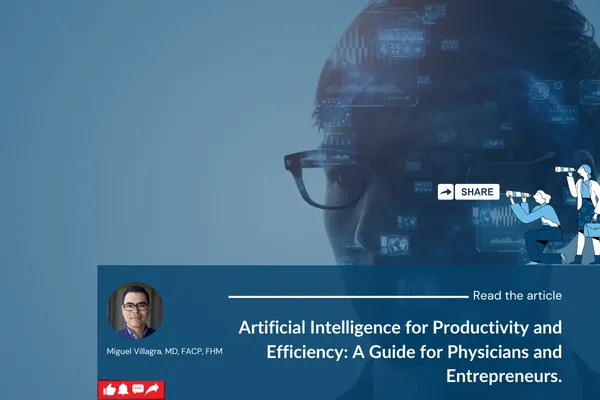
Are you ready to transform healthcare and make a lasting impact?
Join the Healthcare Innovation An Introduction for Physicians Online Course!
INSTRUCTORS:
Miguel Villagra, MD, FACP, FHM
Uli K. Chettipally, MD, MPH
BLOG POST
BLOG POST

Artificial Intelligence for Productivity and Efficiency: A Guide for Physicians and Entrepreneurs.
Artificial intelligence (AI) is revolutionizing various industries, including healthcare and business. For physicians and entrepreneurs, AI offers powerful tools to enhance productivity and efficiency. By automating routine tasks, improving decision-making, and providing deep insights, AI helps professionals focus on what truly matters. This blog post will explore the fundamentals of AI, its applications, best practices for implementation and some of the best AI tools available.

Introduction to Artificial Intelligence: Key Concepts and Definitions
AI refers to the simulation of human intelligence in machines programmed to think and learn like humans. Key components of AI include:
Machine learning (ML): algorithms that allow computers to learn from and make predictions based on data.
Natural Language Processing (NLP): Enables machines to understand and respond to human language.
Computer Vision: Allows machines to interpret and make decisions based on visual data.
Deep learning is a subset of machine learning involving neural networks with many layers, enabling high levels of data processing and pattern recognition.
Differentiating between AI, machine learning, and deep learning:
AI is the broader concept of machines being able to carry out tasks in a smart way.
Machine learning is a current application of AI based on the idea that machines should be able to learn and adapt through experience.
Deep learning is a subset of machine learning with neural networks comprising many layers, making it capable of high-level abstractions.
Applications of AI in Healthcare and Business: Enhancing Productivity and Efficiency
Automating Administrative Tasks:
AI can handle scheduling, billing, and documentation, reducing the administrative burden on physicians and business owners. For example, AI-powered chatbots can manage patient inquiries and appointments, freeing up staff for more critical tasks.
Enhancing Diagnostic Accuracy:
AI algorithms can analyze medical images and data with high precision, assisting in the early detection and diagnosis of diseases. For instance, AI tools like PathAI can help pathologists identify cancerous cells more accurately.

Streamlining patient management:
AI systems can create personalized treatment plans, monitor patient progress, and predict potential complications. Additionally, AI can help healthcare providers optimize their workflow and improve overall patient care.
Predictive Analytics for Proactive Care:
AI can analyze large datasets to predict patient outcomes and potential health issues before they become critical. This proactive approach is beneficial for managing chronic diseases and reducing hospital readmissions. It can also help healthcare providers identify high-risk patients who may require more intensive interventions.
Best Practices for Implementing and Leveraging AI
How to Effectively Implement AI:
1. Choosing the Right AI Tools: Select AI tools that align with your specific needs and integrate well with your existing systems.
2. Integrating AI with Existing Systems: Ensure seamless integration of AI tools with your electronic health records (EHR) or business management systems.
3. Ensuring Data Privacy and Security: Implement robust data security measures to protect sensitive information and comply with regulations like HIPAA.

Best Practices for Leveraging AI:
1. Continuous Learning and Training: Regularly update your knowledge and skills to keep pace with AI advancements.
2. Monitoring and Evaluation: Continuously monitor AI performance and make necessary adjustments to optimize outcomes.
3. Ethical Considerations in AI: Ensure ethical use of AI, including fairness, transparency, and accountability in AI-driven decisions.
Practical Example: Getting Started with AI Using ChatGPT
One of the most accessible ways to start leveraging AI in your practice or business is through AI-powered text generation tools like ChatGPT. Here’s how you can get started:
Creating effective prompts:
To get the best results from AI tools like ChatGPT, it’s crucial to create clear and specific prompts. Here are some tips:
1. Be specific: Clearly state what you need. For example, instead of asking, "Tell me about AI," you can ask, "Explain how AI can be used to improve diagnostic accuracy in healthcare."
2. Provide context: Give the AI some background information to understand your request better. For example, "I am a physician looking to implement AI tools in my practice. How can AI help streamline patient management?"
3. Set the Tone and Style: Indicate the tone or style you prefer. For example, "Provide a detailed explanation in a professional tone suitable for a medical journal."
4. Iterate and refine: You may need to refine your prompts based on the initial outputs. Don’t hesitate to ask follow-up questions or clarify further.

Example Prompt for ChatGPT:
"Write a detailed blog post on how AI can help physicians improve diagnostic accuracy. Include examples of AI tools currently in use and discuss their benefits."
Steps to Get Started:
1. Sign Up for an AI Tool: Choose an AI tool like ChatGPT and sign up for an account.
2. Explore Documentation and Tutorials: Familiarize yourself with the tool's features and capabilities by reading documentation and watching tutorials.
3. Experiment with Prompts: Start by experimenting with simple prompts and gradually move to more complex queries.
4. Integrate AI into Your Workflow: Identify areas in your practice or business where AI can provide the most value and integrate it into your daily operations.
Case Studies: Real-world AI Applications in Healthcare and Business
Case Study 1: AI in Medical Diagnostics:
AI tools like Aidoc use deep learning to analyze medical imaging, assisting radiologists in detecting anomalies and diagnosing conditions more accurately.
Case Study 2: AI in Business Analytics:
AI platforms like Tableau leverage machine learning to analyze business data, providing actionable insights and predictive analytics that help entrepreneurs make informed decisions.

Case Study 3: AI in Customer Service and Engagement:
AI chatbots like Intercom enhance customer service by providing instant responses to inquiries, managing bookings, and offering personalized recommendations based on user behavior.
In Conclusion: Key Takeaways from Harnessing AI for Productivity and Efficiency
Artificial intelligence is transforming the way physicians and entrepreneurs operate, offering tools that enhance productivity, efficiency, and decision-making. By understanding AI, implementing best practices, and leveraging the right tools, professionals can significantly improve their workflows and achieve better outcomes. Embrace AI to stay ahead in your field and unlock new levels of productivity and success.

Artificial Intelligence for Productivity and Efficiency: A Guide for Physicians and Entrepreneurs.
Artificial intelligence (AI) is revolutionizing various industries, including healthcare and business. For physicians and entrepreneurs, AI offers powerful tools to enhance productivity and efficiency. By automating routine tasks, improving decision-making, and providing deep insights, AI helps professionals focus on what truly matters. This blog post will explore the fundamentals of AI, its applications, best practices for implementation and some of the best AI tools available.

Introduction to Artificial Intelligence: Key Concepts and Definitions
AI refers to the simulation of human intelligence in machines programmed to think and learn like humans. Key components of AI include:
Machine learning (ML): algorithms that allow computers to learn from and make predictions based on data.
Natural Language Processing (NLP): Enables machines to understand and respond to human language.
Computer Vision: Allows machines to interpret and make decisions based on visual data.
Deep learning is a subset of machine learning involving neural networks with many layers, enabling high levels of data processing and pattern recognition.
Differentiating between AI, machine learning, and deep learning:
AI is the broader concept of machines being able to carry out tasks in a smart way.
Machine learning is a current application of AI based on the idea that machines should be able to learn and adapt through experience.
Deep learning is a subset of machine learning with neural networks comprising many layers, making it capable of high-level abstractions.
Applications of AI in Healthcare and Business: Enhancing Productivity and Efficiency
Automating Administrative Tasks:
AI can handle scheduling, billing, and documentation, reducing the administrative burden on physicians and business owners. For example, AI-powered chatbots can manage patient inquiries and appointments, freeing up staff for more critical tasks.
Enhancing Diagnostic Accuracy:
AI algorithms can analyze medical images and data with high precision, assisting in the early detection and diagnosis of diseases. For instance, AI tools like PathAI can help pathologists identify cancerous cells more accurately.

Streamlining patient management:
AI systems can create personalized treatment plans, monitor patient progress, and predict potential complications. Additionally, AI can help healthcare providers optimize their workflow and improve overall patient care.
Predictive Analytics for Proactive Care:
AI can analyze large datasets to predict patient outcomes and potential health issues before they become critical. This proactive approach is beneficial for managing chronic diseases and reducing hospital readmissions. It can also help healthcare providers identify high-risk patients who may require more intensive interventions.
Best Practices for Implementing and Leveraging AI
How to Effectively Implement AI:
1. Choosing the Right AI Tools: Select AI tools that align with your specific needs and integrate well with your existing systems.
2. Integrating AI with Existing Systems: Ensure seamless integration of AI tools with your electronic health records (EHR) or business management systems.
3. Ensuring Data Privacy and Security: Implement robust data security measures to protect sensitive information and comply with regulations like HIPAA.

Best Practices for Leveraging AI:
1. Continuous Learning and Training: Regularly update your knowledge and skills to keep pace with AI advancements.
2. Monitoring and Evaluation: Continuously monitor AI performance and make necessary adjustments to optimize outcomes.
3. Ethical Considerations in AI: Ensure ethical use of AI, including fairness, transparency, and accountability in AI-driven decisions.
Practical Example: Getting Started with AI Using ChatGPT
One of the most accessible ways to start leveraging AI in your practice or business is through AI-powered text generation tools like ChatGPT. Here’s how you can get started:
Creating effective prompts:
To get the best results from AI tools like ChatGPT, it’s crucial to create clear and specific prompts. Here are some tips:
1. Be specific: Clearly state what you need. For example, instead of asking, "Tell me about AI," you can ask, "Explain how AI can be used to improve diagnostic accuracy in healthcare."
2. Provide context: Give the AI some background information to understand your request better. For example, "I am a physician looking to implement AI tools in my practice. How can AI help streamline patient management?"
3. Set the Tone and Style: Indicate the tone or style you prefer. For example, "Provide a detailed explanation in a professional tone suitable for a medical journal."
4. Iterate and refine: You may need to refine your prompts based on the initial outputs. Don’t hesitate to ask follow-up questions or clarify further.

Example Prompt for ChatGPT:
"Write a detailed blog post on how AI can help physicians improve diagnostic accuracy. Include examples of AI tools currently in use and discuss their benefits."
Steps to Get Started:
1. Sign Up for an AI Tool: Choose an AI tool like ChatGPT and sign up for an account.
2. Explore Documentation and Tutorials: Familiarize yourself with the tool's features and capabilities by reading documentation and watching tutorials.
3. Experiment with Prompts: Start by experimenting with simple prompts and gradually move to more complex queries.
4. Integrate AI into Your Workflow: Identify areas in your practice or business where AI can provide the most value and integrate it into your daily operations.
Case Studies: Real-world AI Applications in Healthcare and Business
Case Study 1: AI in Medical Diagnostics:
AI tools like Aidoc use deep learning to analyze medical imaging, assisting radiologists in detecting anomalies and diagnosing conditions more accurately.
Case Study 2: AI in Business Analytics:
AI platforms like Tableau leverage machine learning to analyze business data, providing actionable insights and predictive analytics that help entrepreneurs make informed decisions.

Case Study 3: AI in Customer Service and Engagement:
AI chatbots like Intercom enhance customer service by providing instant responses to inquiries, managing bookings, and offering personalized recommendations based on user behavior.
In Conclusion: Key Takeaways from Harnessing AI for Productivity and Efficiency
Artificial intelligence is transforming the way physicians and entrepreneurs operate, offering tools that enhance productivity, efficiency, and decision-making. By understanding AI, implementing best practices, and leveraging the right tools, professionals can significantly improve their workflows and achieve better outcomes. Embrace AI to stay ahead in your field and unlock new levels of productivity and success.
Many physicians considered therapy, self-help resources and support groups before finding our coaching more effective due to its personalized, goal-oriented approach.
Join our innovative life coaching programs that integrate Positive Intelligence to build mental fitness, resilience and emotional intelligence.
TAKE PART IN OUR SURVEYS

Gain insights into your current MENTAL and EMOTIONAL STATE.

This survey aims to understand the current state of HAPPINESS and WELL-BEING among physicians and to gather INSIGHTS on effective strategies for fostering JOY in the medical profession.
TAKE PART IN OUR SURVEYS

Gain insights into your current MENTAL and EMOTIONAL STATE.

This survey aims to understand the current state of HAPPINESS and WELL-BEING among physicians and to gather INSIGHTS on effective strategies for fostering JOY in the medical profession.

Join our NEWSLETTER!
Stay in the loop with our latest updates, exclusive offers, and expert insights by joining our newsletter! Receive valuable content directly to your inbox and be the first to know about upcoming events and promotions. We never share your info to others. You can also opt out anytime.
You are granting Adoctorsjourney permission to send you occasional emails with updates, resources, and special offers. You can unsubscribe from these emails at any time by clicking the "unsubscribe" link at the bottom of any email we send you. We will not share your information with any third parties without your consent.
Join the Movement: Subscribe for Healthcare Innovation & Career Tips!
Physician Well-being & Resilience: Strategies for managing stress and burnout. Building emotional intelligence and mental fitness.
Positive Leadership for Physicians: Developing positive communication and conflict resolution skills. Leading with empathy and emotional intelligence.
Physician Career Transition or Pivot: Setting meaningful goals and achieving work-life integration. Navigating career challenges and transitions.
CLICK TO WATCH THE VIDEO...
Join the Movement: Subscribe for Healthcare Innovation & Career Tips!
Physician Well-being & Resilience: Strategies for managing stress and burnout. Building emotional intelligence and mental fitness.
Positive Leadership for Physicians: Developing positive communication and conflict resolution skills. Leading with empathy and emotional intelligence.
Physician Career Transition or Pivot: Setting meaningful goals and achieving work-life integration. Navigating career challenges and transitions.
CLICK TO WATCH THE VIDEO...
355 E Plumb Lane #1098, Reno, NV, 89502, USA
915-800-0690
Elevate Your Leadership and Career
Gain the tools and strategies needed to become a more effective and inspiring to our fellow physicians, entrepreneurs and other sectors. Follow us on social media, sign up for our newsletter and engage with our community to stay inspired, informed, and connected on your journey of transformation.
SUBSCRIBE TO OUR NEWSLETTER
You are granting Adoctorsjourney permission to send you occasional emails with updates, resources, and special offers. You can unsubscribe from these emails at any time by clicking the "unsubscribe" link at the bottom of any email we send you. We will not share your information with any third parties without your consent.
Elevate Your
Leadership and
Gain the tools and strategies needed to become a more effective and inspiring to our fellow physicians, entrepreneurs and other sectors. Follow us on social media, sign up for our newsletter and engage with our community to stay inspired, informed, and connected on your journey of transformation.
SUBSCRIBE TO OUR NEWSLETTER
You are granting Adoctorsjourney permission to send you occasional emails with updates, resources, and special offers. You can unsubscribe from these emails at any time by clicking the "unsubscribe" link at the bottom of any email we send you. We will not share your information with any third parties without your consent.
Copyright @ 2024 Adoctorsjourney, LLC
All Right Reserved.



